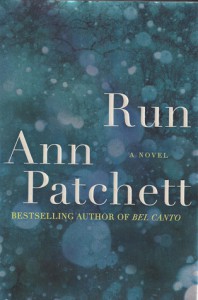 Patchett has great turns of phrase; she manages to write books that are compelling and also contain pretty prose. However, this felt like she was just stretching too far. On page 43 when it is clear that Kenya knows the boys, I immediately thought, "Oh God, it is their mother." I was relieved a few pages later that this was revealed (and not the big plot suck for the book), but of course was then able to pin point that she would end up the daughter and get the coveted statue (with which, of course the book opens).
Patchett has great turns of phrase; she manages to write books that are compelling and also contain pretty prose. However, this felt like she was just stretching too far. On page 43 when it is clear that Kenya knows the boys, I immediately thought, "Oh God, it is their mother." I was relieved a few pages later that this was revealed (and not the big plot suck for the book), but of course was then able to pin point that she would end up the daughter and get the coveted statue (with which, of course the book opens).Patchett just tried too hard to cram too much into this novel. Not only do we have race and class and politics, but there is also religion and the question of who is "really" a mother, oh yeah and also Sullivan's mess with drugs and scandal and vehicular manslaughter. The fact that Tennessee is not really Kenya's mother was kind of interesting, but then the fact that Tennessee knew Father Sullivan and was beloved just was too much.
I couldn't stop wondering if Doyle wouldn't be as interested in any of them if they were just normal kids. Instead Tip is brilliant, Teddy has more charisma than JFK, and Kenya is gonna win the Olympics. Come on...really? These are the three most gifted kids in Boston here, of course he wants to claim them as his own.
I think the best part of the book was the passage in which Father Sullivan questions his faith: "It seemed from this moment of repose that God may well have been life itself. God may have been the baseball games, the beautiful cigarette he smoked alone after checking to see that all the bats had been put back behind the closet door. God could have been the masses in which he told people how best to prepare for the glorious life everlasting, the one they couldn't see as opposed to the one they were living at that exact moment in the pews of the church hall, washed over in the stained glass light. How wrongheaded it seemed now to think that the thrill of heartbeat and breath were just a stepping stone to something greater. What could be greater than the armchair, the window, the snow? Life itself had been holy." Unfortunately, this was just a sidetrack in the novel.


